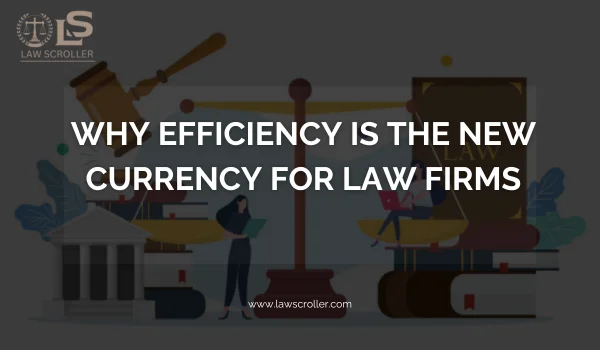What drives success for law firms in 2025—reputation, size, or efficiency?
In today’s competitive legal market, efficiency is fast becoming the ultimate currency. Clients no longer choose firms based on prestige alone. They look for lawyers who can deliver high-quality results quickly, without unnecessary delays or inflated costs.
Let’s say, a mid-sized law firm juggling dozens of cases. The partners are talented, but their days are consumed by endless emails, document formatting, and scheduling conflicts.
Deadlines start slipping. Clients grow impatient. Over time, the firm’s reputation for “responsiveness” fades—and so does its profitability.
That’s the cost of inefficiency. It silently eats away at productivity, client satisfaction, and long-term growth. And in 2025, it’s separating thriving firms from those barely keeping up.
How Did Efficiency Become The New Competitive Edge For Law Firms?

The shift started years ago but accelerated when the pandemic reshaped the legal world.
Remote work, client expectations for speed, and technology adoption redefined how firms operate.
According to the Clio Legal Trends Report (2024), lawyers now spend only 2.5 hours per day on billable work, with administrative tasks consuming the rest. That means nearly 60% of their time is lost to non-revenue activities.
Firms that recognized this imbalance started investing in better workflows, law firm automation, and support systems.
As a result, they began closing cases faster, handling more clients, and increasing billable hours—all without burning out their attorneys.
Efficiency became the differentiator. In a market flooded with capable lawyers, the firms that work smarter are the ones clients remember.
What’s Slowing Law Firms Down?
Most law firms don’t lack talent—they lack structure. Attorneys wear too many hats: lawyer, manager, and admin. Over time, that drains productivity and morale.
Common bottlenecks include:
- Endless admin tasks like scheduling and billing
- Manual client intake and document review
- Partners handling non-billable work
- Outdated systems that can’t keep up
A Thomson Reuters (Source) study found firms lose up to $9,000 per lawyer annually due to inefficiencies. Every missed billable hour or untracked task impacts the bottom line. That’s why improving workflow and law firm financial management is essential for profitability.
How Are Top Firms Turning Efficiency Into Profitability?
Modern firms have realized that efficiency doesn’t just save time—it increases revenue.
Take a boutique litigation firm in California. They adopted document automation software and hired a virtual assistant to handle client intake. Within six months, their case processing time dropped by 30%. That meant more cases closed and more referrals coming in.
Here’s how efficient firms operate differently:
- They automate repetitive tasks like billing, follow-ups, and contract drafting.
- They delegate strategically, letting attorneys focus only on high-value legal work.
- They track productivity metrics instead of just billable hours.
The outcome is a leaner, more profitable operation where everyone works within their highest skill zone.
If your firm needs reliable help with legal admin, client management, or document prep, Wyzer Staffing offers trained Virtual Legal Assistants that are ready to support your team. Click here to book a consultation today.
How Virtual Assistants At Wyzer Staffing Fits Into The Efficiency Equation
Here’s where Wyzer Staffing steps in—not as a competitor, but as a partner in productivity.
Wyzer Staffing helps law firms scale operations by providing vetted virtual legal assistants and executive support professionals. These assistants integrate directly into your firm’s workflow, handling the time-consuming tasks that slow teams down.
Whether it’s client intake, discovery coordination, or document management, Wyzer’s team helps attorneys stay focused on client strategy and legal excellence.
Firms that partner with Wyzer often see a quick improvement in response times and internal communication. They also gain the flexibility to handle workload surges without committing to full-time hiring.
Conclusion
The legal world is evolving faster than ever. Firms that adapt, delegate, and optimize their workflows will lead the charge. Those that cling to outdated processes risk being left behind.
Efficiency isn’t about doing more—it’s about doing what matters most. And when your team, technology, and support systems align, you don’t just save time—you build a law firm that thrives in 2025 and beyond.
Want to explore how virtual staffing can help your firm run smarter, not harder? Contact Wyzer Staffing today and book a free consultation.

 Oliver Johnson is LawScroller’s Senior Legal Correspondent specializing in civil litigation, class actions, and consumer lawsuit coverage. He breaks down complex settlements and court decisions into clear, practical guidance for readers.
Oliver Johnson is LawScroller’s Senior Legal Correspondent specializing in civil litigation, class actions, and consumer lawsuit coverage. He breaks down complex settlements and court decisions into clear, practical guidance for readers.